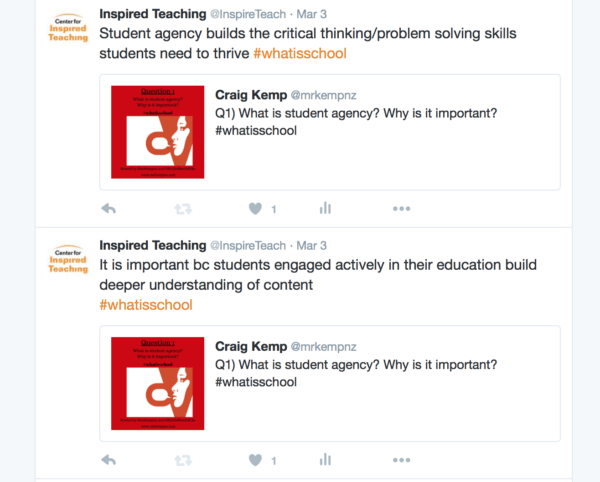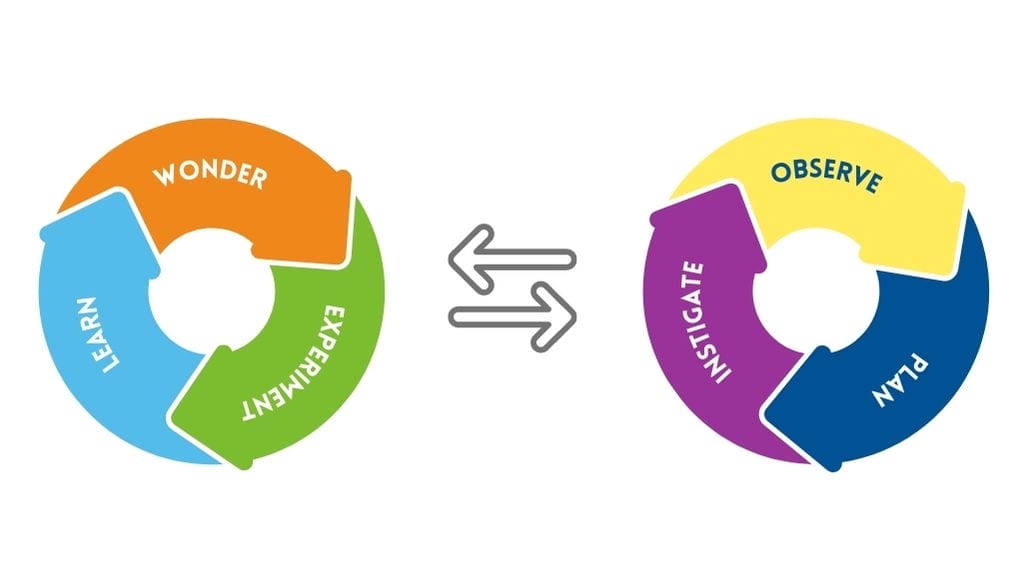March 23, 2016
This piece – written by Aleta Margolis, Inspired Teaching’s Executive Director – appeared in Inspired Teaching’s March newsletter. For more insights like these sent to your inbox every week, subscribe to Hooray For Monday.
“What is student agency? Why is it important?” Recently, the Nellie Mae Education Foundation hosted a #WhatIsSchool Twitter chat, which focused on strategies to develop student agency in the classroom. Like the Nellie Mae Education Foundation, Inspired Teaching believes that developing students’ ownership over their learning is crucial in teaching them to become creative, critical thinkers. At Inspired Teaching, we think about student agency all the time: what it means, what it looks like, how to cultivate it, and how to encourage teachers to embrace it in their classroom practice. Distilling our thoughts on this complex topic into 140 characters was an excellent exercise, and now I’m happy to illustrate our Tweets with stories from the classrooms of Inspired Teachers.
 What is student agency? Why is it important? Student agency builds the critical thinking and problem solving skills students need to thrive. It is important because students engaged actively in their education build deeper understanding of content. Our 20th anniversary “teacher feature” series, recently highlighted Mr. Abdu’l-Karim Ewing-Boyd, an alumnus of the 2006 Inspired Teaching Institute and an educator at Elsie Whitlow Stokes Community Freedom Public Charter School. In describing his experience with Inspired Teaching, he said our training helped him recognize the importance of engaging every student and enabling the class to connect lessons to their own lives. As he stated:
What is student agency? Why is it important? Student agency builds the critical thinking and problem solving skills students need to thrive. It is important because students engaged actively in their education build deeper understanding of content. Our 20th anniversary “teacher feature” series, recently highlighted Mr. Abdu’l-Karim Ewing-Boyd, an alumnus of the 2006 Inspired Teaching Institute and an educator at Elsie Whitlow Stokes Community Freedom Public Charter School. In describing his experience with Inspired Teaching, he said our training helped him recognize the importance of engaging every student and enabling the class to connect lessons to their own lives. As he stated:
“If what you’re learning doesn’t relate to who you are, then there’s no place for you to store that information. There’s no way to understand it. That’s neurologically proven… And in terms of basic human respect – if there’s no effort on the part of the teacher to make what you’re doing relevant to students, then you’re not recognizing students as people. They’re just a set of checkboxes to you.”
The Inspired Teaching Institute pushes teachers out of their comfort zones so they can see how they learn best – and we all learn best when we are engaged as individuals.
What skills do students need to take ownership of their learning? Every student has the skills; it’s the teacher’s responsibility to find a way to reach every student. At Inspired Teaching, we believe and our instructional model recognizes that every student has the potential to build the skills they need to thrive. To build these skills – which include confidence, self-advocacy, perseverance, risk-taking, creativity, and curiosity – teachers must create a classroom environment that helps students understand their social-emotional needs as well as their academic work. The walls of Inspired Teaching classrooms are papered with student ideas, from a class-generated set of norms and expectations to an “emotions continuum” that allows students to share their feelings and learn about those of their classmates. With this continuum tool, students practice self-regulation and move their placeholder from one emotion to another depending on how they are feeling throughout the day. Straightforward yet deeply thoughtful structures like this ensure that students feel in control of their emotions and their ability to learn, and teachers are better able to reach each individual student and support his or her growth.
How can student input opportunities be turned into leadership opportunities? Student as Expert – student voice and ideas should be abundant in every lesson. When students are given the opportunity to provide meaningful input, they learn leadership skills like active listening, the ability to give and receive feedback, and how to pose creative solutions to complex challenges. This month, Real World History alum Zawadi Carroll describes how, after a semester in college, she returned for an interschool seminar on the works of Ta-Nehisi Coates – this time as a facilitator rather than as a participant. She wrote of her experience:
“Everyone’s voice mattered. This facilitation not only allowed me to share some of my thoughts, but also allowed me to learn from my peers. By the end of our discussion I had received almost more than I’d given. My mind was filled with new insights and information. This was the kind of mind I would need to succeed in college.”
Ts are afraid to “relinquish control” of the c/room. What should/shouldn’t Ss have control over? Teachers should teach students how to think; students should have control of what they think. Inspired Teachers teach students how to think, instead of doing the thinking for them. As Instigators of Thought, they avoid spoon-feeding information to students, giving excessive instructions, or supplying answers. At the most recent DC Public Schools’ professional development day, our SCALE teacher leaders taught their K-12 how to unleash the potential of students and deepen their understanding of content by utilizing students’ imaginations. Teachers were taught a lesson on fossils, which could be used to assess and build on students’ prior knowledge through a process that encourages learners to create, reason, and share their work with confidence.
I see the shift towards student-centered learning taking place every day. By participating in conversations like #Whatisschool, I hope more and more educators, administrators, parents, and students recognize the potential of enabling student agency – and that they understand that it is necessary for students to thrive. Help Inspired Teaching ensure that student voices are heard in all classrooms throughout the District. Learn more about opportunities for prospective lead and master teachers at the Inspired Teaching Demonstration School; for DC charter school teachers to participate in BLISS and SCALE; and for prospective new teachers to join future cohorts of Inspired Teaching Fellows. The conversation does not end here.





















